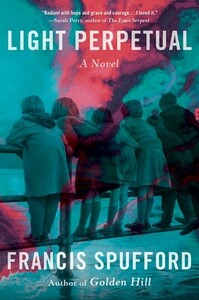Take a photo of a barcode or cover
emotional
inspiring
reflective
slow-paced
Plot or Character Driven:
Character
Strong character development:
Complicated
Loveable characters:
Complicated
Diverse cast of characters:
No
Flaws of characters a main focus:
Yes
This book took me a really long time to read - I wasn't drawn into any of the characters during any of the times (Val during her stint as the wife of a Nazi and Jo during her time as a musician being perhaps the exceptions).
I liked most of the plot lines but the fear of cannabalism / paranoia of Ben just did me in.
A novel I admired more than I actually enjoyed. Unsure which side of the fence I’m on; seeing the transience of life laid bare, or a bunch of ‘what’s the point’? Can see it’s merits, but wanted it to be more experimental.
Book 10/13 on my read through the Booker longlist.
I enjoyed reading Light Perpetual, but left it feeling somewhat underwhelmed. The gimmick of imagining alternative lives has no bearing on the plot at all, so really just felt like a marketing hook/ way to bait prizes into giving it credit for stylistic innovation.
It is still a perfectly good book. I particularly enjoyed Jo's storyline, and the first scene of her singing in class as a child sets up the other character arcs nicely. All of the characters we follow are relatively well realised, but the time jumps mean it is hard to properly track their development or become too invested in their lives.
Overall, I can't see anyone hating Light Perpetual, but I also can't see it being anyone's top book of the longlist. Of all the books I have read so far, it is the one I am most confident won't be shortlisted (even though I personally liked it more than some of the others)
I enjoyed reading Light Perpetual, but left it feeling somewhat underwhelmed. The gimmick of imagining alternative lives has no bearing on the plot at all, so really just felt like a marketing hook/ way to bait prizes into giving it credit for stylistic innovation.
It is still a perfectly good book. I particularly enjoyed Jo's storyline, and the first scene of her singing in class as a child sets up the other character arcs nicely. All of the characters we follow are relatively well realised, but the time jumps mean it is hard to properly track their development or become too invested in their lives.
Overall, I can't see anyone hating Light Perpetual, but I also can't see it being anyone's top book of the longlist. Of all the books I have read so far, it is the one I am most confident won't be shortlisted (even though I personally liked it more than some of the others)
the thing about this “alternate timeline” is what is the alternative? the characters are fictional, so we have nothing really to compare it against? i don’t care that they didn’t actually have these lives… idk this didn’t all the way work for me
emotional
reflective
medium-paced
Plot or Character Driven:
Character
Strong character development:
Yes
Loveable characters:
Complicated
Diverse cast of characters:
Yes
Flaws of characters a main focus:
Yes
There are some breathtakingly beautiful and affecting passages of writing in this novel, which offers a profound reminder of the miraculous and precarious nature of existence. I should've loved it but, whilst intrigued by the premise, I struggled to really connect with it.
Light Perpetual begins with the bombing of Woolworths in 1944 killing, amongst many others, five young children in an instant. One second in time is changed and the bomb never happened, Alex, Jo, Val, Ben and Vern grow up and experience all the changes and challenges of the rest of the twentieth century.
I really enjoyed this book right from the beginning, it is a clever observation of five normal lives and I liked how the author entwined these characters into a variety of different events and eras as they moved through the years. Ultimately, none of these children grow up to have lived extraordinary lives, but as each constantly navigates their way over personal hurdles (relationships, mental health, financial struggles, unemployment, parenthood, drug abuse, violence) and their characters evolved throughout the book, they were almost unrecognisable from the children they had once been. It is a brilliant portrayal of the ordinary human life, full of hope and courage that no matter what life throws at us, we will be ok.
I really enjoyed this book right from the beginning, it is a clever observation of five normal lives and I liked how the author entwined these characters into a variety of different events and eras as they moved through the years. Ultimately, none of these children grow up to have lived extraordinary lives, but as each constantly navigates their way over personal hurdles (relationships, mental health, financial struggles, unemployment, parenthood, drug abuse, violence) and their characters evolved throughout the book, they were almost unrecognisable from the children they had once been. It is a brilliant portrayal of the ordinary human life, full of hope and courage that no matter what life throws at us, we will be ok.
Some good and bad here, although that of course oversimplifies.
This novel is a collection of stories covering the fictional alternate lives of five children killed by the Woolworth V2 rocket, which killed 160 people in 1944. Spufford takes snapshots of their lives, one day every 15 yrs. What comes out is a post-WW2 history of the cultural changes of a fictionalized southeast London suburb. It‘s in some ways very simple, but also has something to it that is a little hard to pin down. Seems the more I think about it the more I appreciate it.
Readers should take note that there some issues. Among it's not-flawed flaws is an almost perfect schoolboy prose, precise, with an carefully elaborate vocabulary, and that comes out dry, and flat. And it's essentially plotless and a little slow and a little too writer-friendly. I think critics tend to like it more than readers. For me, i spent a chunk of the book wondering whether or not I was enjoying it, and the whole book wondering whether I should be. It‘s better in hindsight.
A curious aspect is that I spent so much time wondering how essential the V2 plot line set up is to the heart of the book. It‘s possible the whole book could exist as just the lives of five WWII era kids, without that setup. Their lives are plain, and yet dramatic and tragic enough. But do these tie, the set-up and stories? I caught a few subtle links built-in while reading, and now, looking at the whole thing I‘m finding they actually tie-in really well in several different ways, especially in the sense of 20th century themes. This is in some ways specific to England and its collapsing social hierarchies, but there is still a universal aspect, and deep worry and wonder of what has become of this post WWII world.
For what it's worth, the book first really captured me at what he calls T + 35, 35 years after the bomb and when the kids are now nearly 40. He caught something here, a sense of mid-career disappointment when there is still time to redirect and begin again, but effort and the habit discourage. Before that my connection with the book was tenuous, after I was very much involved with these five alternate lives.
I'm not sure how I would recommend this, but I am glad it's on the Booker long list and that I read it.
-----------------------------------------------
49. Light Perpetual by Francis Spufford
reader: Imogen Church
published: 2021
format: 12:37 audible audiobook (336 pages in hardcover)
acquired: September 24
listened: Sep 25 – Oct 16
rating: 3½
locations: “Bexford”, which is a fictionalized version of Deptford, in southeast London.
about the author: Born 1964 probably in Cambridge to two academic historians (both have Wikipedia entries).
This novel is a collection of stories covering the fictional alternate lives of five children killed by the Woolworth V2 rocket, which killed 160 people in 1944. Spufford takes snapshots of their lives, one day every 15 yrs. What comes out is a post-WW2 history of the cultural changes of a fictionalized southeast London suburb. It‘s in some ways very simple, but also has something to it that is a little hard to pin down. Seems the more I think about it the more I appreciate it.
Readers should take note that there some issues. Among it's not-flawed flaws is an almost perfect schoolboy prose, precise, with an carefully elaborate vocabulary, and that comes out dry, and flat. And it's essentially plotless and a little slow and a little too writer-friendly. I think critics tend to like it more than readers. For me, i spent a chunk of the book wondering whether or not I was enjoying it, and the whole book wondering whether I should be. It‘s better in hindsight.
A curious aspect is that I spent so much time wondering how essential the V2 plot line set up is to the heart of the book. It‘s possible the whole book could exist as just the lives of five WWII era kids, without that setup. Their lives are plain, and yet dramatic and tragic enough. But do these tie, the set-up and stories? I caught a few subtle links built-in while reading, and now, looking at the whole thing I‘m finding they actually tie-in really well in several different ways, especially in the sense of 20th century themes. This is in some ways specific to England and its collapsing social hierarchies, but there is still a universal aspect, and deep worry and wonder of what has become of this post WWII world.
For what it's worth, the book first really captured me at what he calls T + 35, 35 years after the bomb and when the kids are now nearly 40. He caught something here, a sense of mid-career disappointment when there is still time to redirect and begin again, but effort and the habit discourage. Before that my connection with the book was tenuous, after I was very much involved with these five alternate lives.
I'm not sure how I would recommend this, but I am glad it's on the Booker long list and that I read it.
-----------------------------------------------
49. Light Perpetual by Francis Spufford
reader: Imogen Church
published: 2021
format: 12:37 audible audiobook (336 pages in hardcover)
acquired: September 24
listened: Sep 25 – Oct 16
rating: 3½
locations: “Bexford”, which is a fictionalized version of Deptford, in southeast London.
about the author: Born 1964 probably in Cambridge to two academic historians (both have Wikipedia entries).
emotional
hopeful
reflective
Plot or Character Driven:
Character
Strong character development:
Yes

